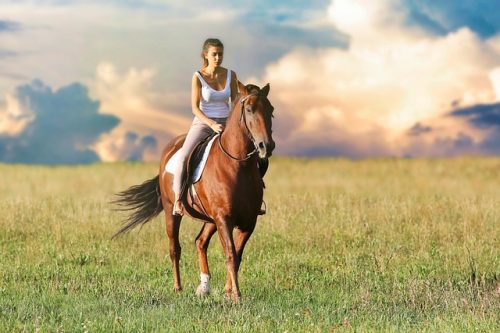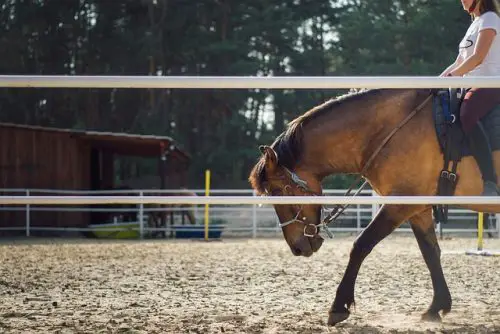Horse riding is a very fun activity carried out by people of all ages including pregnant women. This article is specifically meant to enlighten you on the benefits of horse riding while pregnant but first, I have to discuss how safe it is to ride a horse while pregnant before moving to the benefits.

How Safe Is It To Ride A Horse While Pregnant?
In pregnancy, there are three trimesters that comprise three months in each trimester to make a total of nine months for normal conception. In the first trimester, the baby sits in your pelvic girdle just below your abdomen where it is protected by the walls of your pelvis. Therefore, it is a bit safe to ride your horse during the first trimester since you may not even be aware that you are pregnant at this stage.
If you have been a devoted and ardent rider before you got pregnant, chances are you will ride into the first two to three months of conception before you discover you are pregnant. The best step to take is to consult with your gynecologist since all pregnancies are different depending on a woman’s health and body type to know if you can continue riding.
From the information I gathered, horseback riding during your pre-natal period has more disadvantages than benefits due to the risk involved that could result in the loss of your baby or a permanent injury to your reproductive organs.
Don’t leave this page as I unravel the mystery behind riding with pregnancy.
Benefits of horse riding while pregnant
Horse riding during pregnancy is not different from engaging in other sports or exercise and according to researches carried out on the case, it has been discovered that the expectant mother enjoys a decrease in stress levels, anxiety, and depression.
In addition, there is a reduction in fluid retention in her body and the varicose veins. She will also experience a decrease in tiredness or fatigue and improve your stamina required during labor and delivery.
Your stress hormone known as cortisol is lowered which improves the growth of the fetus and makes you sleep well at night, kegel and pelvic muscles are also strengthened. Other benefits include improved blood circulation, relief from constipation, eased leg cramps, and a reduced case of edema.

The Ideal Period To Stop Riding
When your Obstetrician advises you to quit riding because of your baby’s safety then you must stop especially if you no longer feel balanced on your horse anymore.
Let’s look at various periods during pregnancy with the severity and consequences of riding during each trimester period.
First Trimester
This period is the safest if you still want to indulge in horse riding. In the first trimester, your fetus is still enclosed in your pelvic girdle and protected in your pelvis area by a bony structure from any accidental fall.
Although the baby is protected, you as the mother and carrier may sustain fatal injuries on any part of your body. This will require you to be placed under general anesthesia especially if you have brain damage from the fall while riding without a helmet.
No matter how skillful you are in riding, encountering a fall from your horse is an uncontrollable accident especially with the extra 10-15 pounds you would have added from your pregnant state.
Your womb will be enlarged and your blood vessels will expand as well by the end of your first trimester and this is the period when your doctor will advise against riding to prevent any miscarriage.
Second Trimester
In the second trimester, activities that require dexterity and flexibility gradually become impossible to accomplish due to the significant weight gain around the stomach and pelvis of about 20-30 pounds.
The fetus moves upwards towards the abdomen with a low level of protection than what is obtained during the first trimester. Your body posture and firmness are totally affected and results in general weakness and energy loss. Riding becomes a herculean task as you will not be able to race or engage in a jump as your horse takes flight while you are mounted.
With your balance being affected by your body changes, your muscles and joints will be totally relaxed by the hormone relaxin which is responsible for loosening your muscles and joints thereby offsetting your balance and making it rather difficult for you to sit up straight on the saddle.
Your horse will do a strenuous job of carrying your weight with your posture not properly balanced. Your stability is affected, back pain increases, and mounting or dismounting your horse becomes more difficult during this period with your baby’s weight around 2-3 pounds and positioned in a less enclosed and protected position.
Some women wait until the middle of the second trimester say like 4 months to deliver before they stop riding, but this is very risky for you and the baby. Speak to your gynecologist about your sport and how involved you are so that he can give you the best advice on whether to ride during your second trimester or not.

Third Trimester
The third trimester is the last stage of pregnancy which leads to the delivery of your baby. Most pregnant women in this stage do not ride even if they want to because of how clumsy and uncomfortable the bulge in their stomach makes them feel around the saddle.
Around 25-40 pounds of weight is expected to be gained throughout pregnancy and this is usually obtained during the third trimester. You and your baby are at extreme risk of sustaining injuries due to the sagging and relaxed body parts especially around the abdomen while mounted on your horse.
You do not have to stay away from your four-legged friend totally, instead engage in activities like supervision and training from the ground by building a different perspective of horses in your creative mind. You may even progress to becoming a teacher or trainer on the field after delivery if you realize how competent you are directing and coaching riders on horses and riding techniques.
Grooming is another way to bond with your horse in this stage but remember to sit or squat in a safe position while caring for your horse to avoid putting your baby at risk of suffocation if you place too much of your weight on your stomach with a bad posture.
Ride With Caution
It should be clear to you by now whether to ride a horse while pregnant with the information provided in this article.
Try to stay safe during your riding sessions to avoid placental abruption, a condition where the placenta is detached from the uterus. This can lead to premature labor or miscarriage.
There could be a situation where the horse may kick you in the stomach mistakenly while preparing to mount him especially if he is new to you and this can also lead to a miscarriage.
While riding, you may be thrown or fall off your horse regardless of how experienced you are. Ensure you put all riding or jumping sessions on hold until your baby is born to prevent any loss or accidents.
As a rider, the following are symptoms you ought to look out for when you confirm that you are pregnant to avoid any complications from setting in.
- Abdominal pain
- Pain in the pelvis
- Fatigue
- Vaginal bleeding
- Irregular movement of the fetus
- Palpitations
- Chest pain
- Dizziness
- Shortness of breath
- Amniotic fluid leakage
- Premature labor
- Headache
- General muscle weakness
- Painful or swollen Calf
After delivery
You can return to riding your horse, but it doesn’t have to be immediate. Your body has undergone a lot of changes so you should not expect to just bounce back magically.
Listen to your body and follow the green light it gives when ready. Your riding clothes need to fit well again, and you would have to shed some of the weight you gained during pregnancy. Try to recover before considering riding again!
Glossary

